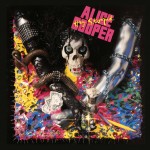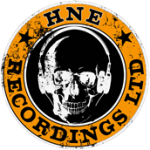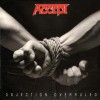Alice Cooper
ALICE COOPER “HEY STOOPID” (1991)
CATALOGUE NUMBER: HNECD 026

1. Hey Stoopid
2. Love’s A Loaded Gun
3. Snakebite,
4. Burning Our Bed
5. Dangerous Tonight
6. Might As Well Be On Mars
7. Feed My Frankenstein
8. Hurricane Years,
9. Little By Little
10. Die For You
11. Dirty Dreams
12. Wind-Up Toy
BONUS TRACKS:
13. Hey Stoopid (Beba Edit)
14. Fire (previously unreleased)
15. It Rained All Night
• A worldwide chart smash, Alice Cooper’s 19th studio record, “Hey Stoopid” built on the huge success of the previous heavy hitter, 1989’s “Trash”.
• Joined by Alice on vocals & harmonica, drummer Mickey Curry, guitarist Stef Burns and bassist Hugh McDonald are a cavalcade of special guests, including highly influential guitar wizards Joe Satriani, Vinnie Moore and Steve Vai, Guns N’ Roses’ Slash, Motley Crue’s Nikki Sixx & Mick Mars (who co-write one track, ‘Die For You’), plus the legendary Ozzy Osbourne providing backing vocals on the album’s title track. Elvira, Mistress of the Dark provides the spoken word part on ‘Feed My Frankenstein’.
• “Hey Stoopid” was produced by Peter Collins, famed for his work with Rush, Queensyrche and Air Supply, among many others.
• Bonus tracks are the Beba Edit of ‘Hey Stoopid’, plus non-album tracks ‘It Rained All Night’ and a cover of Jimi Hendrix’s classic, ‘Fire’.
• The album featured three hit singles; the title track, the self explanatory ‘Love’s A Loaded Gun’ and ‘Feed My Frankenstein’. The latter was performed in the 1992 comedy movie “Wayne’s World”, in which Alice also starred.
There are iconic, landmark albums which help to define an artist and a career. Certainly one can pinpoint the album “Trash”, released in 1989, as helping to resurrect Alice Cooper as a major commercial force. So, given the vagaries and usual conservatism of most record labels, managements and even musicians, you’d have expected Alice Cooper, with the full co-operation and approbation of everyone around him to have decided to keep intact the team that had helped to make “Trash” such a major triumph. But not a bit of it. Instead, Alice made significant changes, the most far-reaching of which was the replacement of Desmond Child, the producer and his main songwriting partner on “Trash”.
“I can’t now recall exactly what happened,” says Alice, “but it must have been a scheduling problem with Desmond. He was probably committed to working with Bon Jovi or Aerosmith, and we were anxious to go straight back into the studio as soon as we could. If Desmond had been available, then we’d have certainly worked with him again. Things went so well on “Trash” that it would have been the logical thing to do.”
Peter Collins, an Englishman who had previously worked with Rush, Nik Kershaw and Queensryche, among others in the past, was the man chosen to produce to new album.
“I liked what he had done, and the ways things worked out it was the perfect choice. Peter has a way of ensuring things are relaxed and fun in the studio, but he’s also very methodical and makes sure things get done properly. He had the ability to take an idea I might have vaguely in my head, and make it work technically. He was also very patient, so if I listened back to something and felt we should alter one note then that would never phase him. He’d go ahead and do it. I had a great time with Peter, and would always work with him again.”
Despite his virtual absence this time, Child does get co-writing credits on two songs, namely ‘Might As Well Be On Mars’ and ‘Dangerous Tonight’.
“I also worked with my old guitarist Dick Wagner on that first song, and I can honestly say for me it’s the best track we ever wrote together. There’s just something about it that came together almost on its own, and this stands out for me as a brilliant representation of what the two of us could achieve.
“For me, ‘Dangerous Tonight’ is the best song ever written about vampires… bar none. It captures what vampires are all about, and has a very special vibe. It’s not scary, but is really cool. But I did want something scary on this album, which is why I did ‘Wind-Up Toy’, and brought back the character of Steven (who originally featured on the “Welcome To My Nightmare” and “Alice Cooper Goes To Hell” albums in 1975 and 1976, respectively). He brought a disturbing edge to this song that I was keen to bring out.”
Steven’s locked away in a lunatic asylum, where his only friends are insects, rats and his toys. It’s certainly a charismatically uncomfortable song. There are two other major songwriters involved on this album, namely Jack Ponti (who was involved in composing the aforementioned ‘Wind-Up Toy’) and Jim Vallance. They both came into this project with established reputations, and each in their own right brought something new to the Alice Cooper canon.
“Jack Ponti had sent me demos of songs, and when I played them I was impressed that he had a great grasp on getting the hook right for a song. To me, as long as there is a clear hook and a song title, then I can do the rest in terms of getting the lyrics done. I liked what Jack did, and I spent quite a bit of time with him in New Jersey working on song ideas.
“When you have been in this business for as long as I have, then you quickly get to know the names of the hottest songwriters around, and Jim Vallance was certainly someone people talked of as being among the best writers around. He’d done a lot of work with Bryan Adams, of course. The way we worked together was that I’d fly up to Vancouver where Jim lived, and we’d literally put aside a four-hour block and see what we came out with. It was his preferred method, and certainly got results for us.”
While there was a clear theme to “Trash”, this time around Alice didn’t want to be grounded and restricted in the same way.
“On “Trash”, the theme was really Sunset Boulevard. But with “Hey Stoopid”, I didn’t feel the same need to have a theme linking all of the songs. And the first song I actually wrote was the title track.
“At the time, there had been a spate of teenage suicides in California, and it got me thinking about what you might say to your best friend if you found out they were thinking of committing suicide. The chances are you would call them ‘stoopid’ for thinking about taking such action. That’s the way you’d talk to a friend, and try to persuade them how crazy it is to think about suicide, and it went from there. This was my open letter to all the teens who thought suicide was a good way out, and I got their attention by yelling “Hey Stoopid” at them!”
Interestingly, Ozzy Osbourne guests on this vigorously anti-suicide song, which somehow was appropriate for the time.
“Ozzy had just fought this law suit brought against him for the song ‘Suicide Solution’.” The parents of two Ozzy fans, who claimed the kids had tried to kill themselves because the song’s lyrics openly encouraged suicide, had unsuccessfully sued the then former Black Sabbath frontman, “So to have him on this song, which was clearly totally against the idea of suicide made a lot of sense.”
Ozzy was just one of a number of top guests, mostly guitarists, who appeared on the album, adding an extra cachet to the final sound and style.
“What happened was that we went to Bearsville Studios in Woodstock to do the basic tracks, and once we had those down, we went down to LA where the fun could start. By that I mean that we could think of all those great musicians whom we could get into the studio to play on a track. It was always a totally spontaneous thing. Just a case of sitting there and thinking, who’d be right to play on this song? And because we were in LA, it was a lot easier to get people down to the studio.”
One of the biggest coups Alice brought off was to get Steve Vai and Joe Satriani to play together on the song ‘Feed My Frankenstein’.
“For me, it was like having the chance to get Jeff Beck and Jimmy Page to play together – a real moment of history. But people kept telling me that I’d never pull it off. They said the problem was that Joe had given Steve guitar lessons, so there was no way the two would agree to appear on the same track, but I didn’t listen to those negatives. I called up and asked them, and they were both really happy to do it! That was great.”
Slash played on the title track, and Alice used his knowledge of the guitarist to ensure the best possible performance was captured for the album.
“I told the studio engineer to roll the tapes as soon as Slash started to play. Don’t wait until he tells you he’s ready. Just get the recording going from the first rehearsal. You see, I know with someone like Slash sometimes the best take will be one that he regards as more than a run-through, and if you miss that moment, then it never comes back. Slash is the sort who will do take after take after take, but nothing can match what he does at the beginning, when the vibe and energy are right. And what you hear on the album was what Slash thought was a rehearsal, but the engineer captured it, and it is killer.”
“This session with Alice was my first studio “session”, as it were,” adds Slash. “I was very excited to have been asked by Alice to do it. The actual recording was pretty fast. Alice encouraged me to just do my thing. Which, in itself was very flattering. It was a fun, no pressure, positive experience. Especially, as I really dug the song, and Alice was so laid back and cool.”
Another guitarist featured was Vinnie Moore, then regarded as one of the hottest young virtuosos on the scene. He played on the songs ‘Hurricane Years’ and ‘Dirty Dreams’, and recalls the sessions with great satisfaction and delight. “Alice was having some guitarists do guest spots on the record, and I was asked to play on two songs. Some rough mixes were sent to me in advance so that I could learn the songs. They were recorded at Bearsville Studios , which was about three or four hours from where I lived. I drove there the night before the session with a couple of guitars and an amp head. I believe it was February 1991, and it was very cold and snowy. When I first met Alice at the studio as they were recording keyboards that night, and he was playing an invented game with one of the band members that they called “scud ball”. It was ping-pong, but they had added a glass to the centre of each side of the table, and you got extra points if you could get the ball into the glass. The term ‘scud’ came of course from the Scud Missile, which we were all hearing too much about on the news at the time.
“The recording went very smoothly and was quick. I think I finished in about four hours. I laid down two rhythm guitars and solos for each song. I remember playing the rhythm straight through for ‘Dirty Dreams’ in one pass. At the end of it, Alice said, ‘It’s obvious you know the song, you played it perfectly. but it’s too perfect, can you do it again and play it more sleazy?’ He wanted a little more rawness, and for it to be more ‘loosey-goosey’. So we went for it again with that approach, which was definitely right for the song. Sometimes when you know you are going to be double tracking a rhythm, you play it in a straight way. Peter Collins was producing, and told me to just go for whatever popped into my head on the first rhythm, and that we would worry about doubling it after. This allowed me to be more free with the part. Everyone would give an opinion here or there, but their approach was that they wanted all the guys who were guesting on the record to do their own thing, so they didn’t try to guide me too much. They wanted me to bring my own energy.
“The session was short and sweet. Afterwards we all went out to dinner, and then I drove home in the evening. it was definitely a little nerve-wracking and a bit surreal to be sitting in the studio working on tunes with Alice Cooper. But I felt fairly comfortable because he was such a normal and nice guy. A couple months later I was asked to join the band, and ended up doing the U.S. tour with them.”
The album was released in July 1991. It got to number four in the UK charts, and number 47 in America. And three singles, ‘Hey Stoopid’, ‘Love’s A Loaded Gun’ and ‘Feed My Frankenstein’, were all Top 40 hits in Britain. And Alice still has a lot of affection for this album. “You know, it has some of the best songs I have ever written. And for that reason alone, it’s an album I still love.”
Malcolm Dome
London, July 2013





